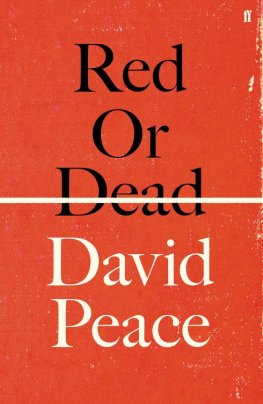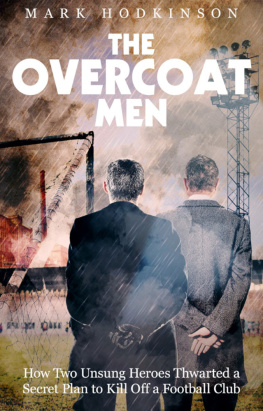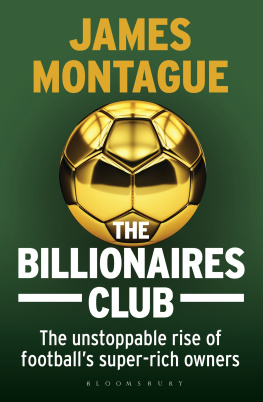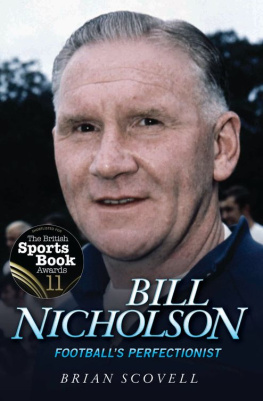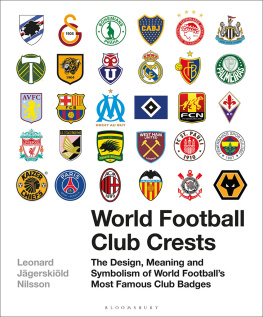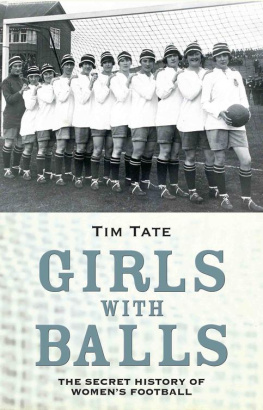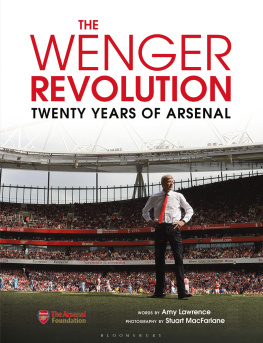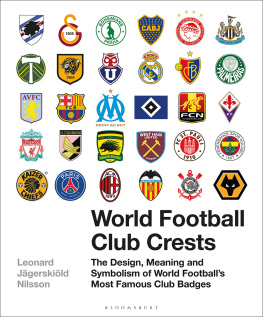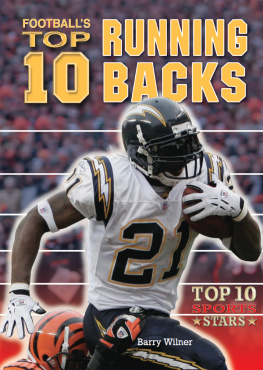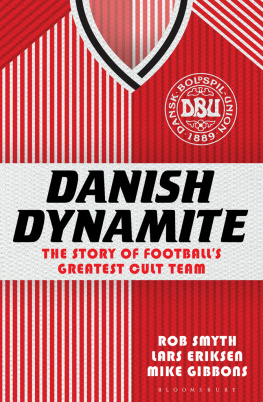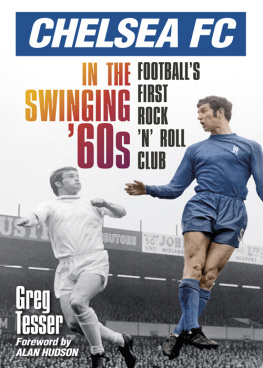Contents
About the Book
Fancy! A lot of working chaps beating a lot of gentlemen!
1879, the third round of the FA Cup. A football team from the humble Lancashire cotton town of Darwen take on Remnants a Berkshire club of the moneyed and well-connected and beat them. It is footballs first ever giantkilling.
Their reward is a quarter-final with the mighty Old Etonians. It pitches rulers against ruled, rich against poor, champions against underdogs, old tactics against new, the inventors of the game against the upstarts. It is an encounter that is seen as symbolic. And, hidden at the heart of the encounter lies the bitterest controversy.
Underdogs is a fascinating story that covers the very birth of football and its development towards the game we recognise today. Storyteller, football connoisseur and historian, Keith Dewhurst, shows how 120 years ago, at its beginning, football was already reflecting the modern game closely money talks, cheating abounds, and victory is secured whatever the cost.
About the Author
Keith Dewhurst has been a yarn tester in a cotton mill, a reporter for the Manchester Evening Chronicle, and a columnist for the Guardian. Six of his seventeen stage plays have been premiered at the National Theatre, and he is the author of more than twenty television plays, two novels, two movies and a theatrical memoir. He is the author of When You Put On A Red Shirt: Memories of Matt Busby, Jimmy Murphy and Manchester United.
ALSO BY KEITH DEWHURST
PLAYS
Raffertys Chant
Lark Rise to Candleford
War Plays (Corunna!, The World Turned Upside Down, The Bomb in Brewery Street)
Don Quixote
Black Snow
Philoctetes (translation)
TELEVISION
Running Milligan in Z Cars, Last Bus in Scene
NOVELS
Captain of the Sands
McSullivans Beach
THEATRE MEMOIR
Impossible Plays (with Jack Shepherd)
FOOTBALL
When You Put on a Red Shirt:
Memories of Matt Busby, Jimmy Murphy and
Manchester United
List of Illustrations
Fergus Suter (courtesy of the Lancashire Telegraph)
Darwen in the late 19th century (courtesy of Darwen Days); cotton town riots (Getty Images)
England versus Scotland, 1872; the electric light match at the Oval (both Getty Images)
Darwen FC team photo (courtesy of Blackburn with Darwen Library & Information Service)
The wall game at Eton (courtesy of Eton College Archive); Eton boys in the 1860s (courtesy of Eton College Archive)
A.N. Hornby (courtesy of Harrow School Archive); Edgar Lubbock; Eton Cricket XI, 1876 (both courtesy of Eton College Archive)
Sir Francis Marindin; Arthur Kinnaird; Sir Charles J.C. Clegg; Charles W. Alcock (all Getty Images)
In memory of our friend Banjo
Keith Dewhurst
Underdogs
The Unlikely Story of Footballs
First FA Cup Heroes
Preamble: Football Mania
From about ten thirty on the night of 29 January 1879, a party of twenty-one young people waited for thirty-five minutes on Londons Aldersgate Street underground station (now called Barbican) for their connection to St Pauls, where they were booked into a private hotel. They had been travelling for more than eight hours from the Lancashire cotton town of Darwen, and most of them were millworkers, although one of the men may have been an Old Harrovian. Another was a doctor, and a third a junior accountant. A fourth was a journalist, and another may well have been James Christopher Ashton, a mill owners son who fancied himself as a writer. There were certainly two Scotsmen, named Jimmy Love and Fergus Suter, and two women, one with a baby, whose names were not recorded. The mill lads were provincial, and joked to cover their unease. When one of them, whom the others nicknamed Jemmy o Woods, asked for a cup of tea at the refreshment bar the waitress could not understand his accent, and thought that he was French. This caused louder hilarity, at which Londoners on the platform were not amused.
In such a fashion did the Darwen football team arrive in London, to play on the following afternoon their third round Football Association Cup tie against Remnants, a Berkshire club of moneyed, well-connected people. Darwens victory was a sensation, footballs first giant-killing, and one of the women with them paced the touchline saying, Fancy! A lot of working chaps beating a lot of gentlemen!
Her words have echoed down the years because of what happened next: in the Cup quarter-finals Darwen were drawn against Old Etonians. They went again to Kennington Oval and with fifteen minutes to go were 51 down, blown away by physically superior opponents. In 1795 the people of Darwen had been called a tall, florid and comely race, but after three generations of industrialisation they were punier than their privileged adversaries. Then with a superior brand of play they fought back to achieve a draw, and it needed two replays to settle the issue.
Rulers against ruled, rich against poor, champions who used old football tactics against underdogs who used new, the men who were supposed to have invented the game against the lower orders who had taken it up: it was an encounter that even during the weeks of the replays was seen to be symbolic. And it had a subtext that within a year or two became a bitter controversy.
For all their gamesmanship, which shocked the newspapers at the time, Old Etonians were the flower of the gentlemen who played for the pleasure of having healthy minds in healthy bodies, whereas Darwen, for all their cash-strapped image, were the harbingers of the spectator sports future. Love and the inspirational Suter were paid professionals, the first men in the world of whom this can be said for certain, and the team itself was the first middle-class attempt to create a ruthless success machine: the first step on that lurid road to the San Siro, Old Trafford and the Nou Camp.
Darwen has been affected by a kind of Football Mania and there happens to have been no life in the town, only that caused by football, wrote the sparky journalist and eventual local newspaper tycoon J. J. Riley in 1879. Today the excitement is long gone and the little town is a run-down shadow of what it was. Mills and their chimneys have been demolished. Pubs have been shut down, and cut-price video shops boarded up. But one can still stand in the main street, as Fergus Suter did, and see moorland a few hundred yards away, and the question arises: why? Why did modern football begin here? What secret chains hold us to that past? What was it about Darwen that made it happen?
PART ONE
Darwen
Folk football
DARWENS INHABITANTS CALL it Darren, and themselves Darreners, and it is one of those places that despite everything has maintained a persistent sense of identity. Since Edward Heaths local government reforms of the 1970s it has been part of Blackburn, as it was for centuries. Yet for a glorious and hard-won period after 1878 it was its own borough, and had its own Member of Parliament, and the mid-Victorian drive to achieve this expressed itself also in the vainglorious ambitions of the football club. Both town and club were created by the Industrial Revolution, from what was a scattering of hamlets and smallholdings on a spur of the Pennine Moors. To the south are Bolton and Manchester, and Darwen is over the top, facing north, in the cleft down which the little River Darwent flows to Blackburn. In the eighteenth century the river was famous for salmon, and at the edge of Blackburn, where the Rovers Ewood Park ground stands today, milch cows grazed, and the fields were white with cloths laid out to bleach.
Next page

